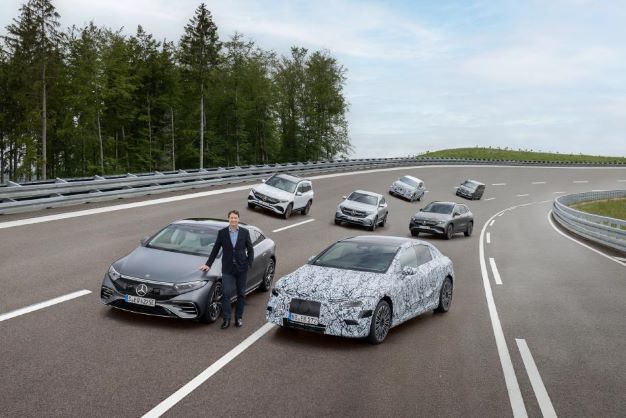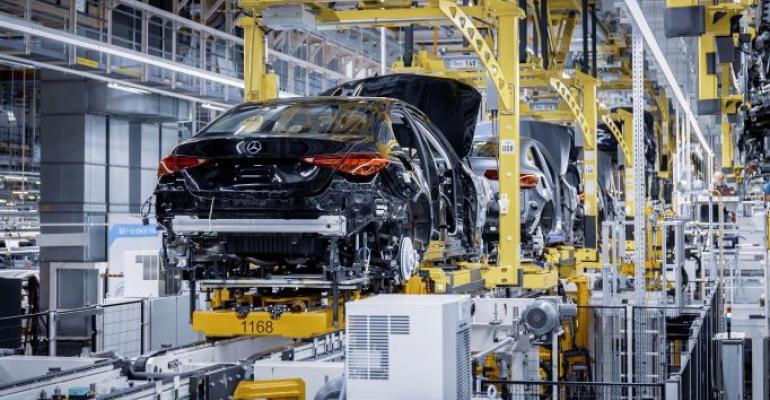Mercedes-Benz is confident that, despite the automotive industry’s current huge transformation process, individual mobility solutions will grow and the industry will grow with it.
That’s the view stated by Chairman Ola Källenius during the extended presentation of the automaker’s ESG (Environment, Social and Corporate governance) Conference 2022.
“We are convinced that demand for individual mobility is still on the rise,” he says. “Global car markets will grow, and our mission is to meet this need in a sustainable way. Climate change is the most important task of our generation.”
However, Källenius (pictured, below left) acknowledges Mercedes-Benz has a lot of work to do to meet its climate and economic targets in the coming two decades.
“First, let’s have a look at our goals,” he says. “Sustainability is one of the guiding principles in our strategy and our path to carbon neutrality is ambitious. We have set ourselves measurable goals.
 “In 2022, we want to achieve CO2-neutral production. In 2025 we want to have up to 50% of our sales as XEVs (electrified powertrains) and by the end of this decade we will be ready to go all-electric wherever market conditions allow. By 2039, along the whole value chain, we want to be CO2-neutral.
“In 2022, we want to achieve CO2-neutral production. In 2025 we want to have up to 50% of our sales as XEVs (electrified powertrains) and by the end of this decade we will be ready to go all-electric wherever market conditions allow. By 2039, along the whole value chain, we want to be CO2-neutral.
“The key to achieving this is a highly attractive electric portfolio. We introduced four new battery-electric vehicles last year and two new electric SUVs follow this year. Demand is on a very high level, we significantly increased our XEV share in 2021 and our goals for 2022 are to increase XEV sales by 40% and our battery-electric sales by more than 100%.
“Our ambition is also to build sustainable cars in a sustainable way. We are reaching a milestone already this year at our own vehicle production locations (which) are now CO2-neutral. What is next, we will increase our share of renewables massively with the target to exceed 70% by 2030.”
Mercedes-Benz also says it plans to reduce the cobalt content of its battery cathodes by 10% in the near future on the way to a cobalt-free solid-state battery expected to enter production by 2028. Also, its “Mercedes Me” home charging units will eventually be able to calculate the amount of electricity used during the charge and then replenish the grid with that energy solely from renewable sources.
Källenius adds: “We will not only use clean energy on a much bigger scale but also produce it. This means we need to foster sustainable business along the entire value chain. I am happy to announce that the vast majority of our suppliers have signed a letter to follow our mission to become CO2-neutral. This will be an awarding criteria – if you want to do business with us in the future, you need to have a sustainable business strategy. All these initiatives and measures taken together means that we want to reduce life-cycle emissions for the average fleet car by 50% until the year 2030.”
A more difficult ambition for the automaker is a stated commitment to protect the interests of human rights. Such a strategy could pose intense commercial problems in the huge Chinese market, as its government faces international criticism for the perceived oppression of the Muslim Uyghur population in Xinjiang province.

Källenius with Mercedes-Benz BEVs in Stuttgart, Germany.
Yet, Källenius says: “Another key criteria is (for) human rights to be respected by partners and suppliers. We will use a systematic approach to identify and mitigate risks early on.”
The automaker’s labor force is a key element in its future ambitions.
Källenius explains: “To transform our business, we also need to transform. We have defined actions in three fields: reshaping the workforce, reskilling and recharging our team. An example of reskilling is 42,000 colleagues have been qualified in e-mobility in the last two years in Germany alone. We are making significant progress in our ICE plant transformation.
The chairman also addresses staff diversity: “We all know diverse teams are more successful. Mercedes-Benz is diverse already; in fact, we exceeded our diversity targets in 2021 but we have set more ambitious goals. We want to have at least 30% women in leadership positions by the year 2030.”
In conclusion, Källenius makes it clear no automaker will achieve all of its sustainability goals without the help of government regulators and acceptance by society in driving forward the climate agenda. “To sum it up, sustainability is a key task for mankind,” he says. “Two things will be decisive for our success: more collaboration between economic, political and societal players, and to accelerate actions. Mercedes-Benz is fully committed, and this course will also lead our company to an economically successful future.”





